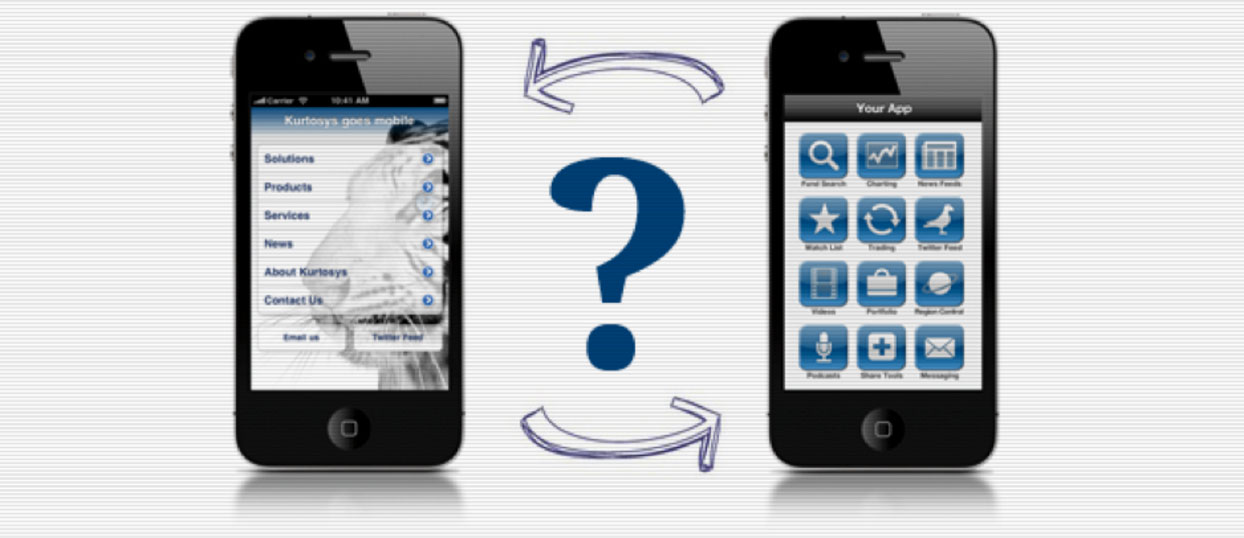-
-
-
-
URL copied!
The dilemma is new, the parameters are not.

As a business owner, it’s difficult to decide where to invest your money and heart when it comes to technology solutions. Do you create a fancy app for your business in place of your mobile site? Or, to make things more complicated, in addition to your mobile site to take it to the next level? To be honest, I don’t have the answer, but I can bring things out into the open so you have a better understanding of your options.
Quite a few major enterprises are moving towards using apps today. Why?
Simply put, because it is cool and convenient -- to the customer, that is. It’s a boutique product done “just for you” and your device. People who are used to an iPhone or Android “feel” will be able to work with your app just like they would with any other feature of an iPhone. The swipes, the menu, the icons - all are custom made for their device.
This makes the app sticky. Because of the convenience the user finds on your app, s/he would keep clicking the icon rather than going to the website of your competition.
In the eCommerce world, for example, some players started going “app only” so that they could reduce scenarios where users bargain hunt across multiple sites loaded on multiple tabs on their phone browsers -- similar to looking at multiple stalls on a street corner. By going app only and investing in your app being addictive through gamification and other engagement tactics, you make it more inconvenient for the user to go out and hop -- like driving to a standalone boutique store.
You have more chances of converting the deal through an app, and you can also use a lot of the user’s phone features (e.g., using the camera to photography how an outfit looks on the user, using geolocation to provide relevant location-based offers, accessing a user’s bluetooth and contacts to do more things). This is similar to a boutique shop investing in enhancers like a cafe or gift corner to boost sales and margins rather than just “doing the thing.”
So why aren’t all businesses taking the same route?
The problems are many. You have multiple OSes (e.g., iOS, Android, Windows), form factors (e.g., mobiles, tablets, phablets), and variations within them (e.g., iPhone 5 is a different size than 6, which is different from 6+). Also, different OS and phone versions are not always backwards compatible. If you code for each of them, how many code versions must you maintain? And if you make compromises, you make your users unhappy and dilute the wow factor that was your basic premise.
Then there are other considerations. Apps take space on the phone. They crowd the phone real estate, meaning users tend to have a limited number of apps on their phones. Your app may not be lucky or compelling enough to stick around on the phone, which will compel you to maintain a mobile site in addition to the app, adding yet another layer of complexity. And even though you have so many different versions of code, you will be expected to maintain a consistent look and feel (and features) across the different versions.
There is always a third solution, isn’t there?
Some choose to build hybrid apps using platforms like PhoneGap, Appcelerator, or plain HTML5. These apps are actually mobile web sites but mimic the look and feel (and idiosyncrasies) of a mobile device. You can customise the solution to a specific device to the extent you wish, or even start with a generic solution and progressively make it specific based on user response. Hybrid apps tend to bring out the best of the both worlds -- albeit, in a limited sense.
As I stated earlier, this article does not provide you with specific answers, only some options and points that you should consider based on my discussions with executives at some of the top eCommerce players in India, the US and the UK. Your final solution will obviously depend on the money you have, the team you can afford, and your particular business’ unique needs. For example, if you are an eCommerce solution, you should probably develop apps; if you are a media site, you may decide based on the depth of your pockets!
Piyush Jha is AVP of Product Engineering for GlobalLogic India. He heads the delivery of the Retail and ECommerce vertical for GlobalLogic globally. He specializes in eCommerce, mobility, IoT and experience design. His interests include reading and travelling the globe to imbibe different cultures. Follow him on LinkedIn.
Top Insights
Manchester City Scores Big with GlobalLogic
AI and MLBig Data & AnalyticsCloudDigital TransformationExperience DesignMobilitySecurityMediaTwitter users urged to trigger SARs against energy...
Big Data & AnalyticsDigital TransformationInnovationRetail After COVID-19: How Innovation is Powering the...
Digital TransformationInsightsConsumer and RetailTop Insights Categories

Let’s Work Together
Related Content
Share this page:
-
-
-
-
URL copied!